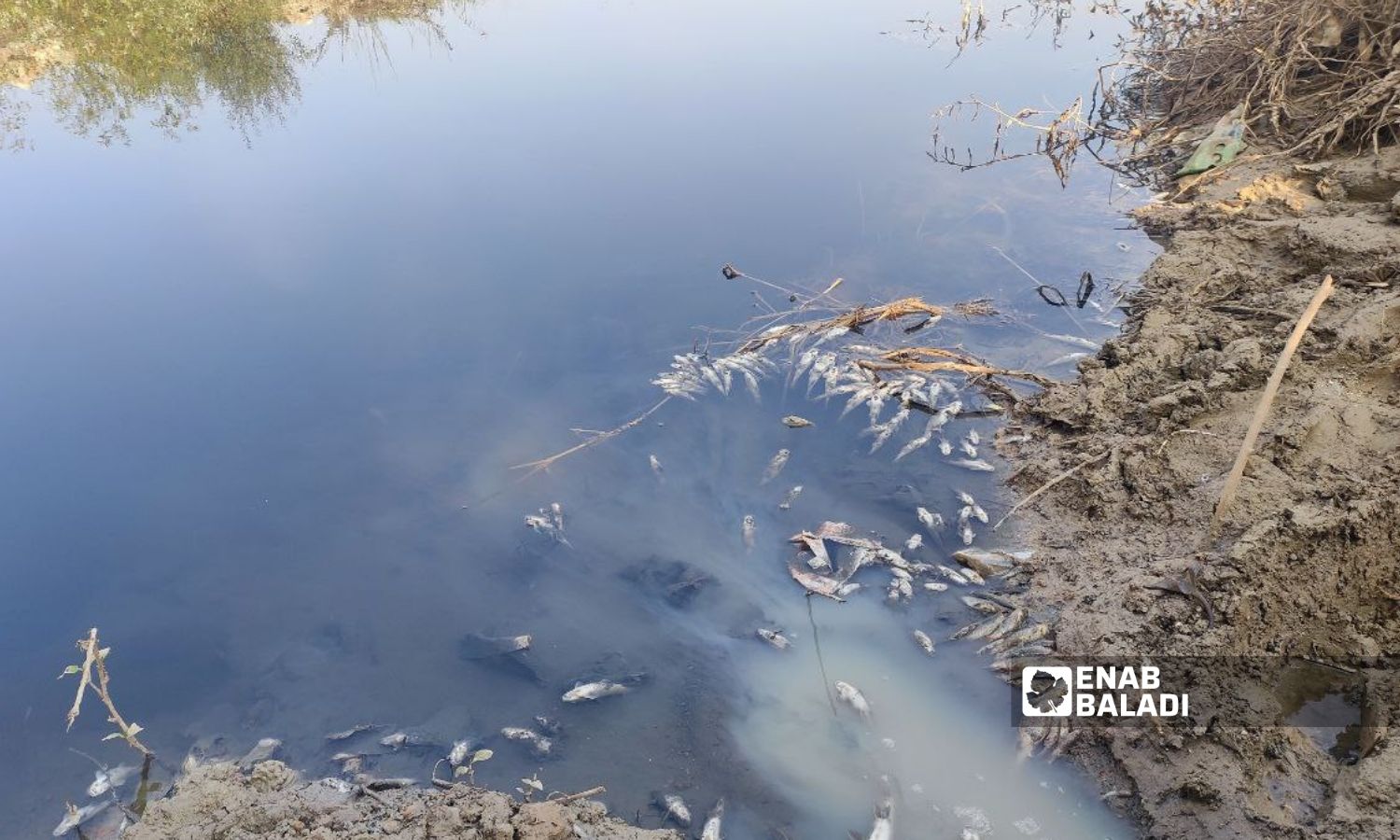



Idlib – Mohammad Nasan Dabel
The past few days witnessed significant pollution in the waters of the Orontes (Asi) River, as it turned black after the waste of olive presses in the Sahl al-Rouj area in rural Idlib was dumped into the river, causing environmental and vital damage to the northwestern region.
There are olive presses in Jisr al-Shughour and its countryside and the villages of Sahl al-Rouj, Meles, and Armanaz, where the remnants of the presses are thrown in separate places of the Orontes River, including the mouth of the White River that feeds the Orontes and the waterfall area in Ain al-Zarqa.
Pollution negatively affected the fish stocks in the river, as it led to the death of thousands of fish of all kinds and sizes, especially the small ones, whose numbers were previously larger, as a result of the high alkalinity of the water, after the river water had previously suffered from sewage residues.
The fisherman, Ghassan Qara Bello, 31 years old, from the city of Darkush, spoke to Enab Baladi about the dependence of the people of the city and its countryside on the Orontes River as a main source of livelihood, explaining the damage that befell them after the death of quantities of river fish.
The fisherman called on the responsible government agencies to find solutions to drain the water of the mills away from the Orontes River, such as ponds or “any other appropriate drainage,” as he put it.
During the first days of the spread of pollution, the people living in the areas surrounding the river picked up large quantities of fish in order to eat them, especially since the large fish were not affected as well as the small ones.
However, the effects on the fish crop were apparent in the following days, so that it became almost non-existent.
Dr. Abdelhay al-Yousef, head of the animal health department in the agriculture ministry of the Syrian Salvation Government (SSG), told Enab Baladi, “There is no direct effect because the poisoning is not caused by harmful chemicals, but by the remnants of olive presses, as eating fish does not have a harmful effect on human health if it is cooked properly.”
The dead fish from the resulting pollution cannot be stored and must be consumed immediately, provided that the period of their stay without cooking does not exceed a maximum of six hours after fishing, according to al-Yousef.
The pollution occurring in the Orontes River was not the first of its kind, as the river is polluted periodically every year, according to the seasons, when the sugar factories start operating, and when the olive presses start working, without any control or prevention from the authorities.
Saleh al-Daraii, water resources director at the agriculture ministry in the Salvation Government, told Enab Baladi, “Owners of olive presses are being informed to convert their water into storage tanks and to prevent it from being poured into sewers or drains leading to the Orontes River.”
He added that the presses owners were also asked to open one of the irrigation gates built on the river in the Qarqour area in the al-Ghab Plain to increase the flow of the river’s abundance and improve the water quality.”
The Orontes River witnessed a previous wave of pollution last July after restarting the sugar factory in the Tal Salhab area in the Hama countryside, which has been suspended since 2015 when the factory management threw waste into the river, which led to the death of a large number of fish and pollution of its water for several days.
On 26 July, the local newspaper, al-Watan, reported the complaints of some residents of al-Ghab Plain due to the flow of sugar beet production products into the Orontes River, agricultural drains, and irrigation canals in the region, in addition to environmental pollution with the foul smell emanating over large areas.
The residents also pointed out to the pro-regime newspaper the threat to the natural fish stocks that live in water bodies and the threat of severe pollution to lands planted with summer vegetables.
Through the newspaper, the people appealed to the “concerned authorities” of the Syrian regime’s government to intervene to address the agricultural, industrial, and environmental problems, pointing to the silence of these authorities on the harmful pollution of the environment and people.
At the time, the health ministry in the Salvation Government warned against eating fish that died of contamination, in addition to the need to report anyone who sells them to take the necessary measures.
The ministry’s circular noted at the same time the emergence of cases of poisoning among the people due to eating fish in the liberated (Opposition-held) areas.
if you think the article contain wrong information or you have additional details Send Correction